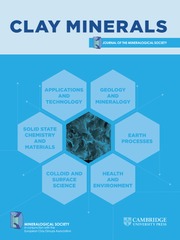Crossref Citations
This article has been cited by the following publications. This list is generated based on data provided by
Crossref.
Rocha, J .
Morais, C. M.
and
Fernandez, C.
2003.
Novel nuclear magnetic resonance techniques for the study of quadrupolar nuclei in clays and other layered materials.
Clay Minerals,
Vol. 38,
Issue. 3,
p.
259.
Hrobarikova, J.
Robert, J.-L.
Calberg, C.
Jérôme, R.
and
Grandjean, J.
2004.
Solid-State NMR Study of Intercalated Species in Poly(ε-caprolactone)/Clay Nanocomposites.
Langmuir,
Vol. 20,
Issue. 22,
p.
9828.
GRANDJEAN, JEAN
2004.
Clay Surfaces - Fundamentals and Applications.
Vol. 1,
Issue. ,
p.
216.
Goldbourt, Amir
and
Madhu, P.K.
2004.
Annual Reports on NMR Spectroscopy Volume 54.
Vol. 54,
Issue. ,
p.
81.
Müller, R.
Hrobarikova, J.
Calberg, C.
Jérôme, R.
and
Grandjean, J.
2004.
Structure and Dynamics of Cationic Surfactants Intercalated in Synthetic Clays.
Langmuir,
Vol. 20,
Issue. 7,
p.
2982.
Wheeler, Paul A.
Wang, Junzuo
Baker, James
and
Mathias, Lon J.
2005.
Synthesis and Characterization of Covalently Functionalized Laponite Clay.
Chemistry of Materials,
Vol. 17,
Issue. 11,
p.
3012.
Rinnert, Emmanuel
Carteret, Cedric
Humbert, Bernard
Fragneto-Cusani, Giovanna
Ramsay, John D. F.
Delville, Alfred
Robert, Jean-Louis
Bihannic, Isabelle
Pelletier, Manuel
and
Michot, Laurent J.
2005.
Hydration of a Synthetic Clay with Tetrahedral Charges: A Multidisciplinary Experimental and Numerical Study.
The Journal of Physical Chemistry B,
Vol. 109,
Issue. 49,
p.
23745.
Malicki, Nicolas
Mafra, Luís
Quoineaud, Anne-Agathe
Rocha, João
Thibault-Starzyk, Frédéric
and
Fernandez, Christian
2005.
Multiplex MQMAS NMR of quadrupolar nuclei.
Solid State Nuclear Magnetic Resonance,
Vol. 28,
Issue. 1,
p.
13.
Wheeler, Paul A.
Wang, Junzuo
and
Mathias, Lon J.
2006.
Poly(methyl methacrylate)/Laponite Nanocomposites: Exploring Covalent and Ionic Clay Modifications.
Chemistry of Materials,
Vol. 18,
Issue. 17,
p.
3937.
Urbanczyk, L.
Hrobarikova, J.
Calberg, C.
Jérôme, R.
and
Grandjean, J.
2006.
Motional Heterogeneity of Intercalated Species in Modified Clays and Poly(ε-caprolactone)/Clay Nanocomposites.
Langmuir,
Vol. 22,
Issue. 10,
p.
4818.
Burzo, E.
2007.
Phyllosilicates.
p.
366.
Bowers, G. M.
Davis, M. C.
Ravella, R.
Komarneni, S.
and
Mueller, K. T.
2007.
NMR Studies of Heat-Induced Transitions in Structure and Cation Binding Environments of a Strontium-Saturated Swelling Mica.
Applied Magnetic Resonance,
Vol. 32,
Issue. 4,
p.
595.
Lantenois, S.
Champallier, R.
Bény, J.-M.
and
Muller, F.
2008.
Hydrothermal synthesis and characterization of dioctahedral smectites: A montmorillonites series.
Applied Clay Science,
Vol. 38,
Issue. 3-4,
p.
165.
Daniel, Lisa M.
Frost, Ray L.
and
Zhu, Huai Yong
2008.
Laponite-supported titania photocatalysts.
Journal of Colloid and Interface Science,
Vol. 322,
Issue. 1,
p.
190.
Daniel, Lisa M.
Frost, Ray L.
and
Zhu, Huai Yong
2008.
Edge-modification of laponite with dimethyl-octylmethoxysilane.
Journal of Colloid and Interface Science,
Vol. 321,
Issue. 2,
p.
302.
Gerstmans, A.
Urbanczyk, L.
Jérôme, R.
Robert, J.- L.
and
Grandjean, J.
2008.
XRD and NMR characterization of synthetic hectorites and the corresponding surfactant-exchanged clays.
Clay Minerals,
Vol. 43,
Issue. 2,
p.
205.
Phillips, Brian L.
2009.
Encyclopedia of Magnetic Resonance.
Le Forestier, Lydie
Muller, Fabrice
Villieras, Frédéric
and
Pelletier, Manuel
2010.
Textural and hydration properties of a synthetic montmorillonite compared with a natural Na-exchanged clay analogue.
Applied Clay Science,
Vol. 48,
Issue. 1-2,
p.
18.
Goure-Doubi, H.
Lecomte-Nana, G.
Nait-Abbou, F.
Nait-Ali, B.
Smith, A.
Coudert, V.
and
Konan, L.
2014.
Understanding the strengthening of a lateritic “geomimetic” material.
Construction and Building Materials,
Vol. 55,
Issue. ,
p.
333.
Fonseca, Carla G.
de Carvalho, Gustavo S.G.
Wypych, Fernando
Diniz, Renata
and
Leitão, Alexandre A.
2016.
Na+ as a probe to structural investigation of dehydrated smectites using NMR spectra calculated by DFT.
Applied Clay Science,
Vol. 126,
Issue. ,
p.
132.


